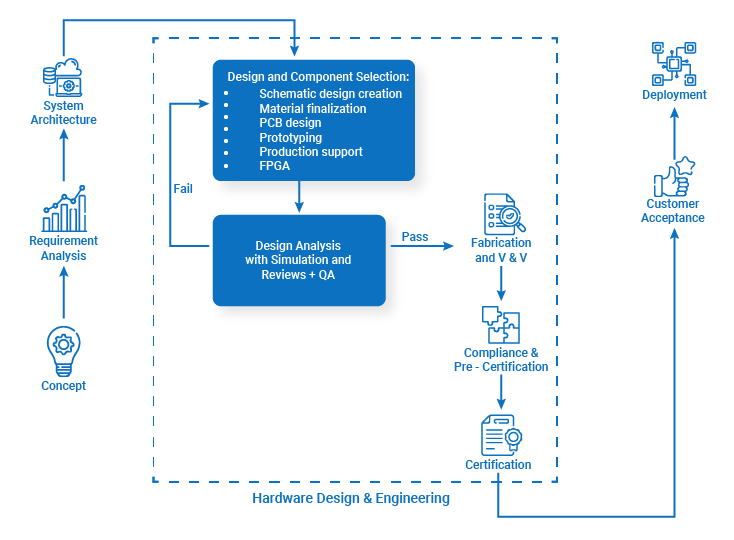- Schematic design creation
- Material finalization
- PCB design
- Prototyping
- Production support
- FPGA (Field Programmable Gate Arrays) design services based on client specifications and requirements
Architecture

Why Do Industries Need Hardware Engineering Services?
With the development of robotics, computer vision, protocol simulators, and other technologies, the scope for hardware engineering services is increasing. The reason for the widespread development is also because embedded systems offer a wide range of benefits for industries. Hardware engineering services can be used for warranty analysis and prediction. It also enables re-engineering of current products to improve their production, quality, and performance. Effective hardware engineering services enhance product sustenance, which in turn increases the lifetime of the equipment and reduces operational costs.
Equipment and machines used on the production floor are exposed to unfavorable conditions. However, as the embedded systems are sealed, they are safe from dust, grime, rust, moisture and other particles, which could damage their parts. So, these systems typically last longer and offer consistent and reliable performance. Plus, the equipment will deliver consistent performance.
Hardware Design Services Provided by Utthunga
Our services are not limited to protocol simulatorsbut also include designing and developing new products, value engineering, sustenance management, obsolescence management, and reverse engineering.
The New Product Development Support and Services that We Offer Our Clients Include:
- Product architecture, design, prototyping
- Digital design (microcontroller/DSP/ASIC/SoC/FPGA)
- Analog front end designs and driver circuits
- Safety critical designs & intrinsically safe designs for hazardous locations
- RF designs
- High reliability system designs
- Communication protocol hardware design services (wired & wireless)
- Protocol Simulators
- Analog /mixed signal/ low power designs
- Signal conditioning for high SNR circuits, special sensor interface
- Modeling and simulations
- MTBF and reliability analysis
- DFM/DFT/DFR
- Product testing
- Hardware certification services
Board Design Expertise:
- High speed design
- Analog, Digital, Mixed and RF designs
- Design compliance to IPC standards
- Constraint management
- Signal integrity analysis, DFM & DFT
- Multilayer PCB Design (24 Layers)
- Design using BGAs (fine pitch of less than 0.65 mm), SoCs
- Fabrication and assembly support
Our Hardware Tools Skillset Includes:
- Cadence: Allegro PCB Design, OrCAD, Capture
- ALTIUM: ALTIUM Designer 10
- Mentor Graphics: DxDesigner, PADS
- SI: Allegro PCB SI, Mentor Graphics HyperLynx SI
- PI: Mentor Graphics HyperLynx PI
- DFM: Mentor Graphics Valor
- Simulation: Ltspice, Pspice
Our Diverse Team is Well Versed in Delivering Value Engineering Solutions such as:
- Design optimization
- BOM cost reduction
- Obsolescence management
- Design recovery of legacy products
- Replacements with new generation products
- Performance enhancements
Why Utthunga for Embedded Hardware Design Services?
Whether you’re looking for a system-level embedded hardware design solution, Protocol Simulator, or enterprise-level hardware design services, we have the experience and the expertise to handle them. We leverage the right-fit technologies to deliver custom hardware services for your company. Utthunga has more than 13 years of experience in the industry and has worked with industries across various sectors and domains. A niche product engineering company, we offer end-to-end hardware engineering services and hardware certification services.
If you are looking for a tech partner to closely collaborate with your team and build custom embedded systems from scratch or re-engineer your current production process using embedded solutions, contact us.
Let’s engineer challenges into opportunities and ideas into reality
FAQs
1. What are the steps involved in embedded hardware design?
The steps involved in embedded hardware design are:
- Fine tuning of the hardware specifications based on the purpose and application of the hardware
- Building the initial prototype after creating a detailed design concept and architecture of the embedded system
- Work on the printed circuit board design and layout
- Assemble and refine the mechanical prototype
- Create a mechanical design
- Use CAD software to produce a 3D prototype
- Design verification and testing of the 3D prototype
- Verified design is passed on to production
- Create support and documentation materials
2. What is embedded design life cycle?
- Mechanical Design – Includes industrial design, 3D modelling, and prototyping
- Firmware Design – Includes creating board support packages, device drivers, protocol stack, porting and bootloader
- Software Design – Includes GUI, application software and middleware creation
- Hardware Design – Includes PCB and FPGA designing. PCB design includes creating the schematics, layout design and BOM. FPGA design includes RTL coding and simulation
